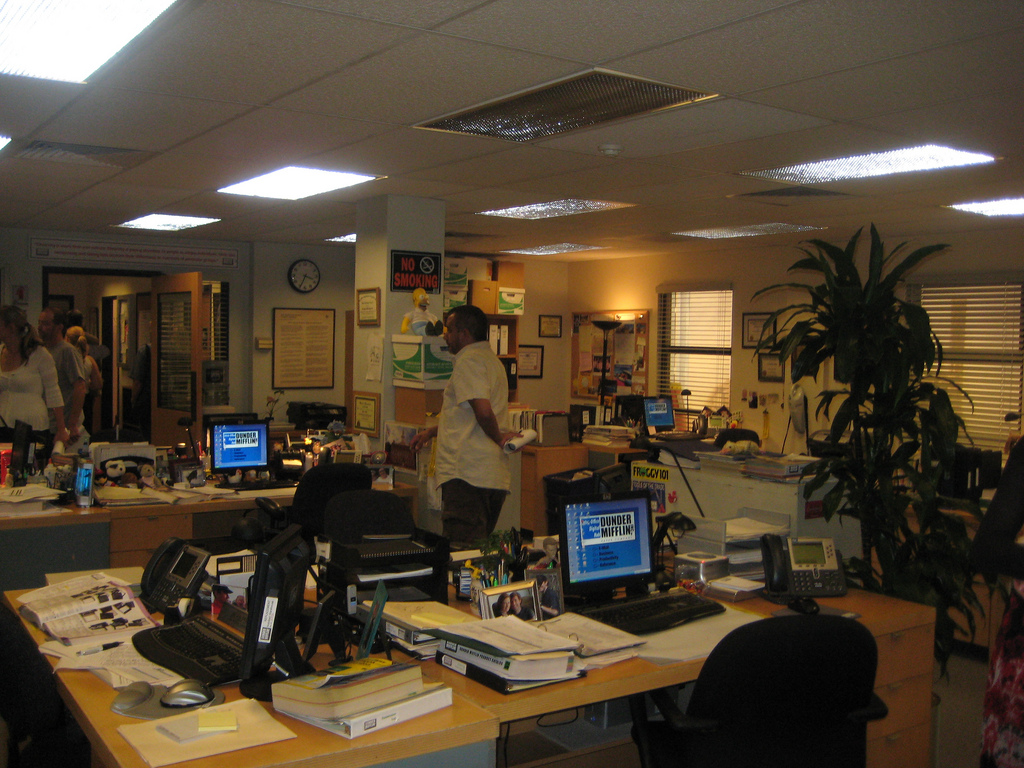In 2013, NBC’s “The Office” ended just as its characters began the newest chapters of their lives, as the documentary crew wrapped up nine seasons of capturing the comedic chaos of paper supply company Dunder Mifflin.
Set within the same television universe, that same documentary crew has now turned its camera on another midwestern business: a struggling local newspaper.
“The Paper” focuses on the fictional Ohio-based “Toledo Truth Teller,” where a small team of journalists and a newly appointed editor-in-chief grapple not only with publishing the news, but also with the difficult task of making a profit from it to remain open.
Made by the creators of “The Office,” this show follows the same mockumentary style, with its awkward pauses and glances to the camera, as well as cast interviews that put the plot in motion. Although “The Paper” features a distinct plot that mirrors the real struggles of local newspapers, it faces the greater challenge of constant comparisons to its predecessor. It’s a comparison that could hinder it from setting itself apart amid the crowded field of mockumentary comedies.
The show revolves around a once buzzing publication that was at its peak in the 1970s. They had upwards of 900 staff members who covered local news, national politics and had even dispatched a few international correspondents. Now, the paper has been reduced to about a dozen employees. Its front page is filled with wire stories from the Associated Press and the occasional high school football piece.
Rather than operating independently, it’s now owned by a corporation called Enervate, which also owns a toilet paper company that the paper shares an office with. Viewers also learn that Enervate acquired Dunder Mifflin, tying the two universes together.
While it’s not entirely fair to expect the show to mirror “The Office,” it does feature characters who add to that familiar comedic workplace environment, with each personality defined by how they contribute, or don’t contribute, to the survival of the paper.
The paper’s editor-in-chief is Ned Sampson, a former toilet paper salesman. Sampson is passionate about bringing the Truth Teller back to its “Woodward and Bernstein” era level of reporting. But he faces an impending challenge: finding news and motivating his team of salespeople, accountants and reporters to scavenge for stories.
The paper’s only experienced journalist is Mare Pritti, a former Army member who previously wrote for a military newspaper. Under Sampson’s leadership, she takes on the challenge of writing low-stakes investigative pieces, one of which explores how multiple mattress companies may be colluding to sell the same products at inflated prices.
Pritti and Sampson are often paired together and generally agree on editorial decisions. But the rest of the staff don’t share their enthusiasm for hard news or reporting.
Esmeralda Grant, the paper’s online managing editor, is headstrong on writing clickbait and sensationalized pieces, which ultimately helps drive traffic and revenue. She often butts heads with Sampson on deciding whether original reporting is better or worse suited for the paper’s survival.
Meanwhile, Nicole Lee manages subscriptions and user data at the circulation desk. Her job is less about journalism and more about monetization, delivering personalized content to readers in hopes of keeping the business afloat.
The cast also includes Oscar Martinez from “The Office,” played by Oscar Nuñez, who reprises his role and character as an accountant.
To truly enjoy this sitcom, it’s best not to view it through the lens of its predecessor. Searching for a “Michael,” “Dwight” or “Jim and Pam” only makes it harder for the show to build its own identity.
The same goes for the showrunners; relying too heavily on recycled storylines or familiar characters risks making the show feel derivative. What makes workplace sitcoms, such as “Abbott Elementary,” so popular is how deeply they lean into their setting. The more accurately “The Paper” reflects the realities of a dying local newsroom, the more compelling and unique it will become.
Peacock has already renewed the show for a second season after all ten episodes dropped on Sept. 4. Whether “The Paper” can build its own identity or stay stuck in its predecessor’s shadow is what fans will be watching for next.









